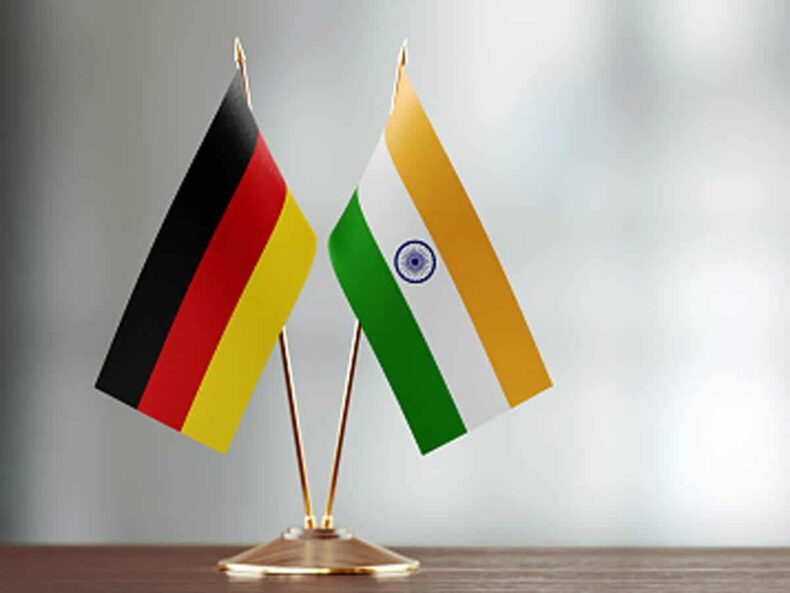Table of Contents
After being one of the world’s major arms exporters for many years, Prime Minister Narendra Modi’s administration wants India to produce more weapons domestically in partnership with foreign partners.

In order to counter China’s expanding influence in the Indian Ocean, India is looking to replace its outdated submarine fleet, 11 of which are conventional submarines. Two indigenous nuclear-powered submarines are also available to the Indian Navy.
Scholz’s visit to New Delhi
Scholz arrived in the nation’s capital, New Delhi, where he was greeted by Prime Minister Narendra Modi and accorded military honors.
“German and Indian ties are excellent, and they aim to get even better. Our conversations will center on it, as well as the importance of world peace “, he said.
During Scholz’s visit, the two nations will discuss the submarine project, for which Germany’s ThyssenKrupp Marine Systems (TKMS) is one of two foreign bidders, and Berlin would support the agreement, according to one source.

To build submarines in India, a foreign submarine builder will need to collaborate with a Local business. The requirement that has rankled the majority of foreign businesses is that the foreign company must transfer a specialized technology for fuel-cell based Air Independent Propulsion (AIP).
Just before Modi’s trip to Paris in May 2022, France’s Naval Group backed out of the project due to its failure to meet the requirements set forth by the Indian government in 2021.
The only remaining contenders are Daewoo Shipbuilding and Marine Engineering of South Korea and German TKMS, which recently inked a deal for jointly developing six submarines with Norway. Requests for feedback from the ministries of foreign affairs and defense went unanswered. Both TKMS and the German government opted out of commenting.
According to a diplomatic source in India, the nation has requested from Germany a guarantee of joint manufacturing of the submarines, not simply supply-side help. Scholz was adamant about reviving defense and trade links with India, according to another foreign ministry official.
War in Ukraine: Scholz and Modi
India’s backing for the severe approach taken by Europe and the US towards Russia about the conflict in Ukraine was something the chancellor was anticipated to ask for.

During their discussion, Scholz and Modi remarked, “We talked about the entire situation and exchanged quite honestly our judgements on the specific scenario that Russia’s invasion of Ukraine has generated.”
Without providing more information about their conversation, Scholz stated, “I suppose one can argue that no one here (in India) is under any illusions, including the government, that this is an aggressive conflict begun by Russia in order to grab a portion of its neighbor’s territory.
Modi stated at the news conference on Saturday with Scholz that India was “ready to participate in any peace initiatives,” adding that New Delhi had been advocating for a diplomatic solution to the problem ever since the war started.
According to Scholz, Modi and he also addressed China’s peace plan for Ukraine.
Aatmanirbhar Defense Programme
Germany is interested in embracing India’s Atmanirbhar defense programme. At the time the offer is made, India is trying to find partners.

India’s defense industry is booming, and it has experienced tremendous recent growth. This is taking place as a result of Prime Minister Narendra Modi’s vision. His “Made in India” and “Aatmanirbhar Bharat” calls have sparked interest from both domestic and international manufacturers in producing defense equipment in India. Almost all products are now produced in India, including anything from aeroplanes to bulletproof clothing.
In addition to trying to increase its submarine fleet, India has surpassed China to become the sixth nation in the world capable of constructing aircraft carriers. The most recent reports are showing promising results for that goal.
Giving Aatmanirbhar Bharat a boost
Curiously, the Indian government is now concentrating on growing local weapon manufacturing in partnership with foreign partners despite years of being one of the largest arms importers in the world. The government wants to make India less reliant on imports and develop a self-sufficient, internationally competitive defense sector.

The government is enticing foreign businesses to partner with Indian businesses and make investments in the nation’s military industry in order to achieve this goal. Additionally, the governme













